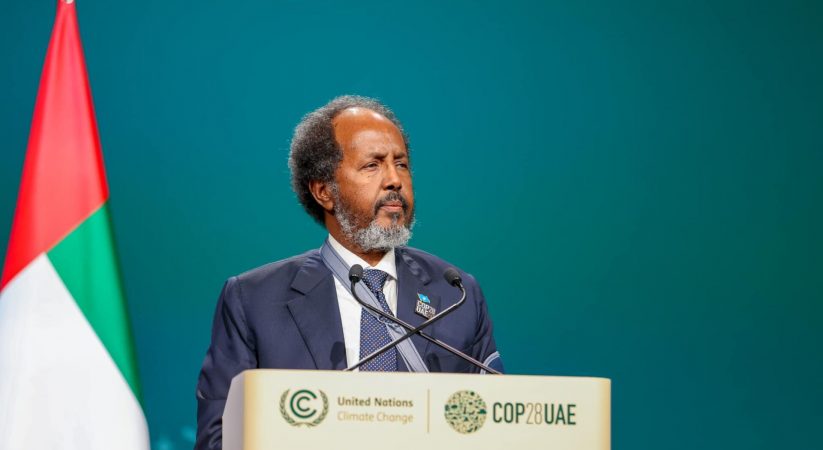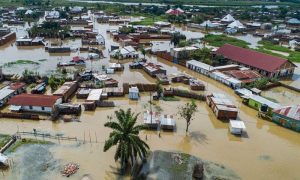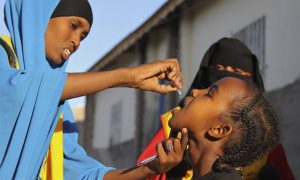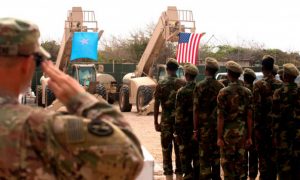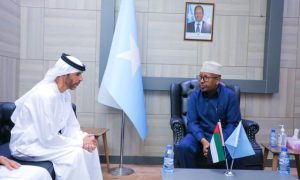
|Commentary : After an intense two-week period marked by rigorous negotiations, this year’s annual global climate summit concluded with some optimism. Hosted by the United Arab Emirates, the COP28 held particular significance against the backdrop of mounting global concerns regarding the inadequacy of effective measures concerning energy transitions, the decarbonisation of the global economy, the imperative to limit global temperature rise to below 1.5°C, and the escalating disproportionate impacts of human-induced climate change.
The diplomatic proceedings over the course of the conference were also characterised by intensive negotiations involving representatives from the Global North, the least developed countries (LDCs), and small island nations. Concrete agendas were put forth, with a particular emphasis on issues such as the Loss and Damage Fund, a proposal that had faced persistent resistance from major economies over the years. Simultaneously, there was a growing momentum behind the call to phase out fossil fuels. The financial requirements of developing countries also garnered increased attention, as global leaders were confronted with the need of providing support to these nations in their fight against the climate crisis.
In regards to Somalia, this year witnessed a momentous milestone in terms of diplomatic engagement. Somalia presented the recurrent climate crisis that has impeded the country’s recovery, underscoring the urgent need for financial support to reverse the growing climate-induced challenges that have paralysed the country’s vulnerable communities.
Operationalisation of loss and damage
The Loss and Damage (L&D) fund has been recognised as a financial mechanism designed to assist communities and countries that suffer irreversible losses and damages due to the impacts of climate change. It emerged in international climate negotiations as a response to the recognition that some climate-related effects cannot be effectively mitigated or adapted to, resulting in unavoidable losses. The fund aims to address these residual impacts by providing financial support for affected countries to cope with, recover from, and adapt to the adverse consequences of climate change. The concept gained prominence within the United Nations Framework Convention on Climate Change (UNFCCC) and the climate negotiators.
The process of operationalisation of the Loss and Damage Fund have faced challenges, notably with resistance from some countries in the Global North. These nations have been hesitant to welcome the fund, often expressing concerns about liability and financial responsibility for climate-related losses.
Moreover, the Global North has at times resisted commitments to contribute financial resources to the fund, hindering its capacity to adequately address the impacts faced by vulnerable communities in the Global South. These debates reflect broader tensions within international climate negotiations regarding the equitable distribution of responsibilities in addressing climate change and its consequences.
Substantial progress was achieved during COP26 in Glasgow and COP27 in Sharm El Sheikh, Egypt. Notably, the Global North, for the first time, agreed to establish the Loss and Damage Fund after prolonged negotiations and intensive lobbying from LDCs countries.
While the establishment of the fund was a notable achievement, questions persist about its source, management, and allocation, which have all been debated since the initiation of the fund. Nevertheless, the operationalisation of loss and damage in COP28 represents a crucial step towards climate equity and tangible financial support.
Financial pledges
This year, the finance of climate crisis assumed a central role. Unprecedented climate finance pledges were achieved, with the Green Climate Fund (GCF) securing a historic level of funding pledges, surpassing $12 billion. In terms of adaptation initiatives, a total pledge of $188 million were dedicated to addressing the impacts of climate change. Additionally, a notable allocation of $700 million were pledged towards the Loss and Damage Fund, demonstrating parties’ commitment to addressing the irreversible consequences resulting from climate-related events.
Furthermore, Multilateral Development Banks (MDBs) emerged as key players in the global climate action finance by making substantial pledges toward climate adaptation investments and the promotion of low-carbon projects. Their financial commitments signal a recognition of the role that these institutions play in driving the transition towards sustainable and just transition.
It’s crucial to note that a substantial portion of financial commitments remain often unmet, accentuating the existing financial disparity. As the impact of the climate crisis intensifies, the urgency to address this gap becomes even more evident. Communities are becoming increasingly disillusioned with promises that have yet to materialise, specifically pledges that haven’t translated into tangible outcomes.
Despite the presence of several commendable financial initiatives, there is a pressing need for the Global North to increase their commitment levels, not only in terms of meeting financial pledges but also in delivering on their pledges.
Fossil fuel phase out
This year’s negotiations on the call to phase out fossil fuels has been momentous. Despite the challenges, primarily stemming from the entrenched political and financial interests of both fossil fuel industries and major economic powers, it remains a crucial topic in climate negotiations. Although a clear consensus or comprehensive roadmap for the gradual phase-out of fossil fuels is yet to be reached, it’s noteworthy that a progress has been made. The COP28 concluded with a crucial reference to transitioning away from fossil fuels in energy systems, in a just, orderly, and equitable manner, indicating a commitment to moving beyond reliance on fossil fuels.
However, the path to materialising this transition remains a subject of uncertainty. Despite the acknowledgment of the need for change, major fossil fuel corporations exhibit reluctance in fully embracing the proposed transition deal.
Nevertheless, the mere acknowledgment of the necessity to move beyond the fossil fuel era is a commendable step forward. The declaration sets the stage for intensive negotiations in the coming months, as stakeholders seek common ground and work towards a plan for a just and orderly transition. The complexity of these negotiations will likely unfold in the lead-up to the next COP, scheduled to take place in Azerbaijan.
Somalia at COP28: a success story

This year marks a distinctive departure from the norm at recent events, as Somalia made strides in diplomatic engagements and negotiations. Central to this was Somalia’s presentation of its Nationally Determined Contributions (NDC) implementation plan, underscoring its dedication to climate action.
In terms of international cooperation, the Somali delegation has advanced their engagement in climate finance dialogues. Through active negotiations, the delegation has worked to secure support for Somalia’s climate initiatives. The country has also made pledges including global cooling pledge.
On multiple occasions, the Deputy Prime Minister, Salah Jama, has emphasised the critical financial shortfall impeding the nation’s ability to effectively combat climate-induced crises, which in turn hinders the country’s overall recovery.
It has been highlighted that the existing financial allocation is inadequate to address the recurrent challenges posed by climate-related emergencies. To confront these issues head-on, an annual budget of $5 billion is deemed necessary; however, the current reality sees the country receiving a mere $300 million.
Furthermore, the Deputy Prime Minister underscored the importance of prioritising the strengthening of state capacities. This, he argued, is essential for adopting a locally-led and locally-owned initiatives, thereby ensuring a sustainable adaptation to climate crisis.
In addition, recognising the global nature of the challenge, the Deputy Prime Minister emphasised the importance of collaborative efforts on both international and regional fronts. Such cooperation, as he noted, is pivotal for developing comprehensive strategies, “led by the state”, that can effectively mitigate the impacts of climate change.
The Deputy Prime Minister’s statements underlined not only the financial challenges the country faces in addressing climate-induced crises but also the necessity of local empowerment and international collaboration for sustainable adaptation, mitigation measures, and durable solutions that goes beyond the emergency response.
Somali youth participation
Throughout the course of this year, we have observed a noteworthy surge in the active involvement of young individuals in discussions. This development represents a milestone in the collective efforts to cultivate a more inclusive and diverse dialogue on the pressing issues of climate crisis within the country.
It is essential to highlight that the youth demographic comprises more than 65% of Somali’s population. This demographic reality underscores the urgency of including young voices in discussions about climate action, as their perspectives, concerns, and ideas are integral to formulating effective strategies for the long run.
The engagement of the youth in these dialogues is not only commendable but also crucial for catalysing climate conscious movement. Their insights and grassroot mobilisations inject a new prospect into the policy implementation, ensuring that the state polices are not only relevant but also sustainable in the future.
Academic participation: a welcome development
The engagement of academic institutions in COP28 has also been commendable. Historically, their role in shaping discussions surrounding climate-related issues had been somewhat overlooked. Witnessing the increasing involvement of academic institutions from Somalia in climate dialogues has been nothing short of inspiring. This heightened participation holds the potential to significantly contribute to the advancement of climate knowledge.
It is also gratifying to observe these institutions taking on a more active role in guiding conversations about climate change. This newfound commitment not only enriches the ongoing discourse but also plays a role in encouraging greater awareness and understanding of climate issues among future graduates.
Civil society groups
In addition to the formal diplomatic delegation and youth representatives, a significant development at COP28 has been the increased participation of civil society organisations from Somalia. The escalating climate crisis in the country demands attention, and the proactive engagement of civil society groups in the negotiation process.
The climate challenges faced by Somalia, including rising temperatures, deforestation, and extreme weather events, underscore the urgency for inclusive and comprehensive climate action. Civil society organisations play a crucial role in advocating for the incorporation of community-driven solutions, ensuring that the policies formulated align with the needs and aspirations of the people affected.
At COP28 Somalia was a notable party and negotiator, therefore it is important that the country comes back next year highly prepared to keep the momentum going. This will ensure that Somalia’s interests are well represented, and results are achieved.
____________________________________________________
Sources: GORFEYN
______________________________________________________________________________
Xafiiska Wararka Qaranimo Online | Mogadishu, Somalia
_____________________________________________________________________________________Xafiiska Wararka Qaranimo Online | Mogadishu, Somalia
_____________________________________________________________________________________Advertisement
_____________________________________________________________________________________


